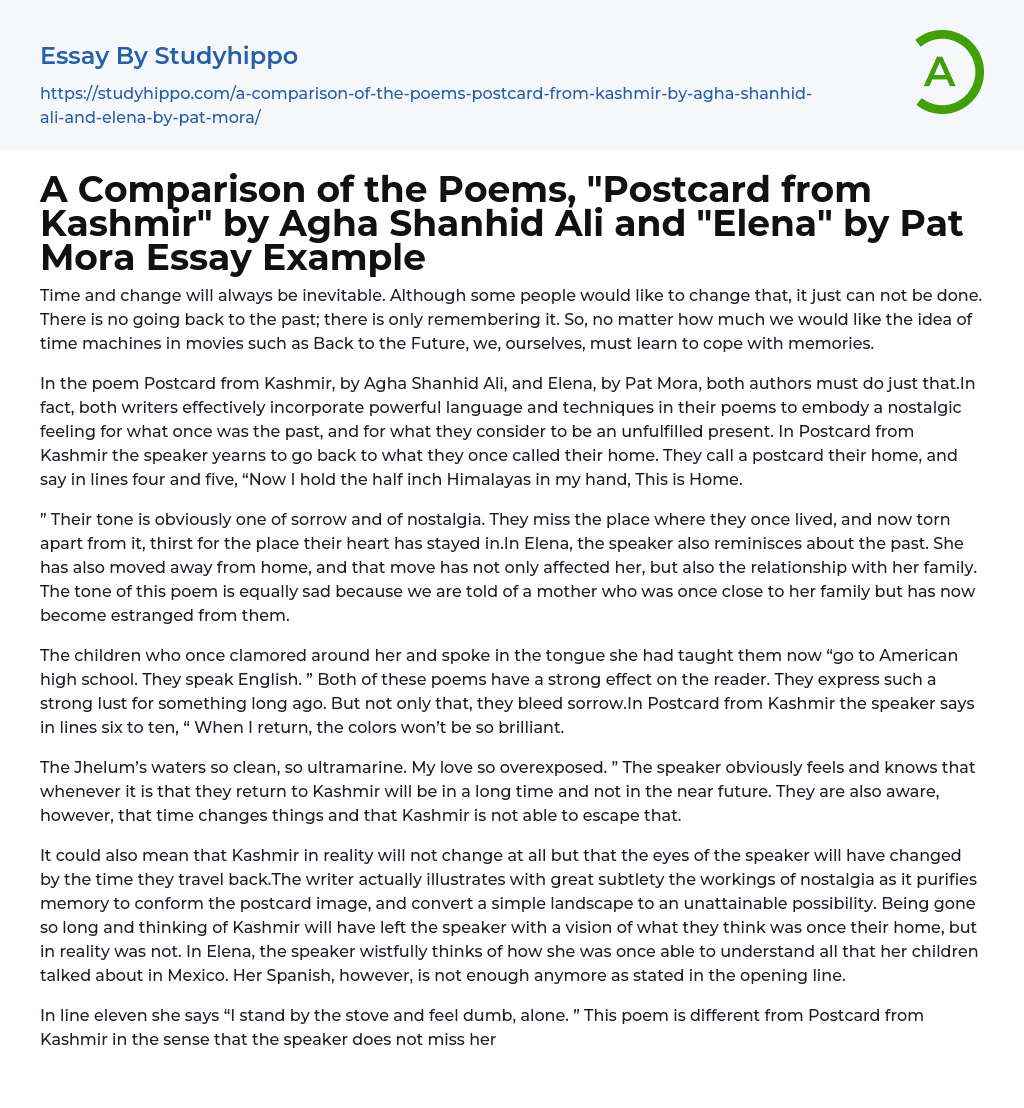Time and change will always be inevitable. Although some people would like to change that, it just can not be done. There is no going back to the past; there is only remembering it. So, no matter how much we would like the idea of time machines in movies such as Back to the Future, we, ourselves, must learn to cope with memories.
In the poem Postcard from Kashmir, by Agha Shanhid Ali, and Elena, by Pat Mora, both authors must do just that.In fact, both writers effectively incorporate powerful language and techniques in their poems to embody a nostalgic feeling for what once was the past, and for what they consider to be an unfulfilled present. In Postcard from Kashmir the speaker yearns to go back to what they once called their home. T
...hey call a postcard their home, and say in lines four and five, “Now I hold the half inch Himalayas in my hand, This is Home.
” Their tone is obviously one of sorrow and of nostalgia. They miss the place where they once lived, and now torn apart from it, thirst for the place their heart has stayed in.In Elena, the speaker also reminisces about the past. She has also moved away from home, and that move has not only affected her, but also the relationship with her family. The tone of this poem is equally sad because we are told of a mother who was once close to her family but has now become estranged from them.
The children who once clamored around her and spoke in the tongue she had taught them now “go to American high school.
They speak English. ” Both of these poems have a strong effect on the reader. They express such a strong lust for something long ago. But not only that, they bleed sorrow.In Postcard from Kashmir the speaker says in lines six to ten, “ When I return, the colors won’t be so brilliant.
The Jhelum’s waters so clean, so ultramarine. My love so overexposed. ” The speaker obviously feels and knows that whenever it is that they return to Kashmir will be in a long time and not in the near future. They are also aware, however, that time changes things and that Kashmir is not able to escape that.
It could also mean that Kashmir in reality will not change at all but that the eyes of the speaker will have changed by the time they travel back.The writer actually illustrates with great subtlety the workings of nostalgia as it purifies memory to conform the postcard image, and convert a simple landscape to an unattainable possibility. Being gone so long and thinking of Kashmir will have left the speaker with a vision of what they think was once their home, but in reality was not. In Elena, the speaker wistfully thinks of how she was once able to understand all that her children talked about in Mexico. Her Spanish, however, is not enough anymore as stated in the opening line.
In line eleven she says “I stand by the stove and feel dumb, alone. ” This poem is different from Postcard from Kashmir in the sense that the speaker does not miss her homeland as much as the shared culture and full understanding of her
family. She feels dumb in front of her children and “embarrassed at mispronouncing words” as stated in line sixteen. Even when she tries to learn English she is reproached in a sense by her husband who starts to drink more. Her oldest reminds her in line fourteen that her husband “ doesn’t want you to be smarter than he is. There is a sort of misery that emits from the speaker herself.
Even when she attempts to try and adapt to the change she is rejected. She still perseveres at it, however, for if she does not she says, in the last line, “I will be deaf when my children need my help. ” Unlike the speaker in Postcard from Kashmir, the speaker suffers more internally. She searches for something that can not be attained by simply moving back to her homeland.
Both poems, however, deal with pain and the effect of losing something to time and change.Both speakers know quite well that what has been lost to time cannot be recovered but still hope that maybe one day in the future they may come close to it. They are both rendered, but wishful. They perceive the present as something not as worthy as the past. When referring to the speakers in the poems both may be seen as ambiguous.
The speaker in Postcard from Kashmir may be the author himself because he was from Kashmir. The speaker in Elena may be talking about what it was like for her mother.However, both poems hold a speaker that can be attributed to anyone. Anyone that misses their home country can feel as the speaker from Postcard
from Kashmir, and any mother who has ever immigrated to the United States feels what the speaker in Elena feels. Ali and Mora touch on the subject of memory skillfully but indirectly in their poems.
They depict memory in both their poems as the only gateway to happiness long ago. They artfully personify memory as a delightful moment of joy that every human thinks back to and longs for.After all, a happy memory is what keeps many of us going. Both poems nonetheless do an exquisite job at connecting with the reader.
They are both filled with pain and longing, but on different levels. The speaker from Postcard from Kashmir longs for a topographical “there” while the mother in Elena just yearns for the understanding she once had with her family. They both feel as if the past surpassed in many ways their present. They are both, however, resigned to accept it and comply with that struggle.




